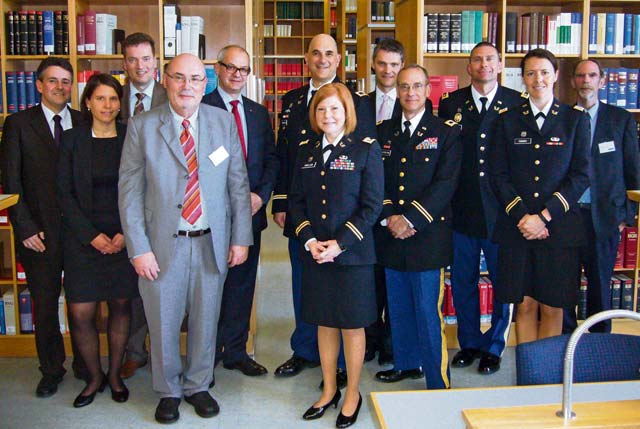
American and German jurists pose for a photo in the library of the Saarbrücken state court during the 21st Theater Sustainment Command’s Office of the Staff Judge Advocate legal exchange visit to the court April 17.
Law professionals from the 21st Theater Sustainment Command’s Office of the Staff Judge Advocate visited the state court of Saarbrücken for an exchange of American and German law specifics April 17.
Leading the military contingent was Col. R. Peter Masterton, military judge of the U.S. Army Europe and Southwest Asia, and Col. Ralph Tremaglio, staff judge advocate for the 21st TSC.
“Sharing each other’s perspectives helps us work together and resolve potential civil and criminal matters that arise from our U.S. citizens living here in support of U.S. forces,” Tremaglio said.
Speedy trial requirements received the most discussion, as it is so important to the fair administration of justice in criminal cases, Tremaglio said. Another topic of interest was divorce proceedings, with the focus on timely serving of documents to members of the U.S. forces in Germany.
“This meeting also gave us an opportunity to make host nation jurists more sensitive to the unique circumstances of our Soldiers — their deployments, extended training absences, limited German language skills and different customs, as they are confronted with German civil court documents and court appearances,” said Joseph J. Hall, chief of the International Law Division, 21st TSC SJA.
The partner nation legal brainstorming was part of an ongoing interchange with host nation authorities, held in the communities surrounding the 21st TSC footprint of law offices, including Baumholder, Stuttgart, the Netherlands and Belgium.
“I truly believe that meetings like these between our fellow local attorneys are imperative to maintaining the tremendous relationships we share with our German communities. They help each side understand the other’s priorities in certain cases,” Tremaglio said.
On average, German-American legal meetings take place every two years, but the command is committed to making it an annual event.
“These legal exchanges are very important to our military mission,” Hall said. “They help us build a common understanding and interpretation of our rights and privileges under the NATO Status of Forces Agreement. Better understanding and agreement on these terms gives our commanders greater flexibility when dealing with issues of order and discipline and for ensuring timely justice proceedings for our Soldiers and civilians.”


